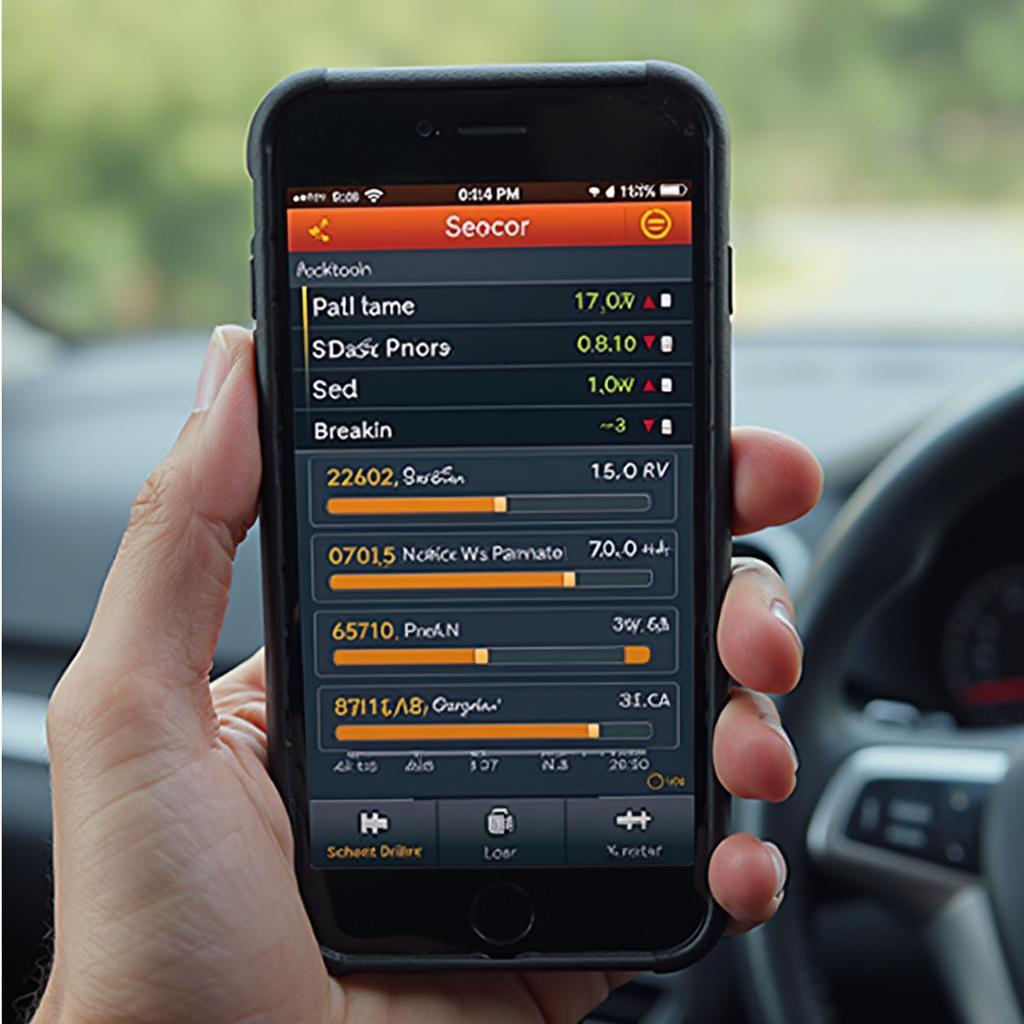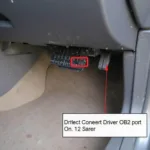The OBD2 port, typically located under the driver’s side dashboard, is a critical component of modern vehicles. This standardized 16-pin connector serves as a gateway for accessing a treasure trove of information about your car’s engine, transmission, emissions system, and more. But what exactly is the OBD2 port under car hood used for?
Unlocking Your Car’s Secrets: The Power of OBD2
The OBD2 port, short for On-Board Diagnostics, second generation, revolutionized car repair and maintenance. This humble port allows mechanics, technicians, and even car owners to communicate directly with a vehicle’s computer, retrieving valuable diagnostic information.
Before OBD2 became mandatory in 1996 in the United States, diagnosing car problems was a time-consuming and often imprecise process. Mechanics relied heavily on experience and intuition, often resorting to trial and error to pinpoint issues. The introduction of OBD2 standardized diagnostics, making it significantly easier to identify and address malfunctions.
What Can You Do With the OBD2 Port?
The OBD2 port opens a world of possibilities for understanding and managing your vehicle’s health. Here are some of the most common uses:
- Reading and Clearing Diagnostic Trouble Codes (DTCs): When your car’s check engine light illuminates, it’s often accompanied by a DTC stored in the vehicle’s computer. An OBD2 scanner can read these codes, providing insight into the potential problem.
- Monitoring Engine Performance: The OBD2 port allows you to access real-time data from your car’s engine, including RPM, speed, coolant temperature, oxygen sensor readings, and more. This data is invaluable for diagnosing issues, monitoring performance, and even improving fuel efficiency.
- Customizing Car Settings: In some vehicles, the OBD2 port can be used to adjust certain vehicle settings, such as door lock behavior, lighting preferences, or even alarm sensitivity. However, the extent of customization varies depending on the car manufacturer and model.
OBD2 Scanners: Your Gateway to Vehicle Insights
To unlock the full potential of the OBD2 port, you’ll need an OBD2 scanner. These handy devices come in various shapes and sizes, from basic code readers to advanced professional-grade tools.
- Basic Code Readers: As the name suggests, these affordable scanners primarily read and clear DTCs. They are an excellent option for car owners who want to understand why their check engine light is on.
- Bluetooth Scanners: These scanners connect wirelessly to your smartphone or tablet, allowing you to access a wider range of data and functionality through dedicated mobile apps.
- Professional-Grade Scanners: These comprehensive tools are typically used by mechanics and technicians and offer advanced features like live data streaming, bi-directional control (the ability to command certain vehicle functions), and access to manufacturer-specific codes.
 OBD2 Scanner App on Smartphone
OBD2 Scanner App on Smartphone
Choosing the Right OBD2 Scanner
With so many OBD2 scanners available, selecting the right one can seem daunting. Consider these factors:
- Your Budget: Basic code readers can be purchased for under $20, while professional-grade scanners can cost hundreds or even thousands of dollars.
- Your Technical Expertise: If you’re a casual car owner, a basic code reader or Bluetooth scanner should suffice. Professional mechanics will require more advanced tools.
- Your Vehicle’s Make and Model: Some scanners are designed to work with specific car makes or models, offering enhanced functionality or access to manufacturer-specific codes.
Empowering Car Owners Through Knowledge
Understanding the purpose and potential of the OBD2 port empowers car owners to take a more proactive approach to vehicle maintenance. By utilizing an OBD2 scanner, you can gain valuable insights into your car’s health, diagnose issues early on, and potentially save on costly repairs.
“The OBD2 port has been a game-changer for car owners,” says automotive expert John Smith. “It’s like having a direct line to your car’s brain, giving you the power to understand its needs and address problems proactively.”
Whether you’re a seasoned mechanic or a car enthusiast, the OBD2 port is an invaluable tool for unlocking the secrets of your vehicle. By understanding its capabilities and investing in the right OBD2 scanner, you can take control of your car’s health and keep it running smoothly for years to come.
FAQs
1. Is the OBD2 port the same on all cars?
Yes, the physical connector for the OBD2 port is standardized across all cars manufactured after 1996 in the United States. However, the location of the port may vary slightly between car makes and models.
2. Can I damage my car by using an OBD2 scanner?
Using an OBD2 scanner correctly will not damage your car. It’s essential to choose a reputable scanner and follow the manufacturer’s instructions carefully.
3. Can I use an OBD2 scanner to turn off my check engine light?
Yes, most OBD2 scanners allow you to clear DTCs, which will typically turn off the check engine light. However, it’s crucial to address the underlying issue that triggered the light in the first place.
4. What is the difference between OBD and OBD2?
OBD stands for On-Board Diagnostics, and OBD2 is the second generation of this technology. OBD2, introduced in 1996, offers standardized diagnostics and a wider range of data compared to earlier OBD systems.
5. Can I install an OBD2 port in an older car?
While it’s technically possible to retrofit an older car with an OBD2 port, it’s a complex process that requires significant technical expertise.
Exploring Further
For a deeper dive into the world of OBD2 scanners and their applications, check out these informative resources:
- Ford Triton OBD2 App: Discover how specialized OBD2 apps cater to specific vehicle models.
- App OBD2 Android Auto: Explore the convenience and functionality of OBD2 apps integrated with Android Auto.
- Best App OBD2 Android: Find the perfect OBD2 app for your Android device.
Need help choosing the right OBD2 scanner or have other car-related questions? Don’t hesitate to reach out to our team of experts via WhatsApp: +1(641)206-8880 or email: [email protected]. We’re available 24/7 to assist you.

